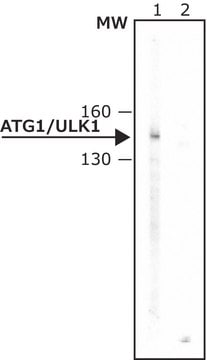추천 제품
생물학적 소스
mouse
항체 형태
purified immunoglobulin
항체 생산 유형
primary antibodies
클론
JG1, monoclonal
종 반응성
human, mouse
종 반응성(상동성에 의해 예측)
hamster (based on 100% sequence homology)
포장
antibody small pack of 25 μL
기술
ELISA: suitable
immunocytochemistry: suitable
immunoprecipitation (IP): suitable
western blot: suitable
동형
IgG3κ
NCBI 수납 번호
UniProt 수납 번호
타겟 번역 후 변형
unmodified
유전자 정보
mouse ... Hspa1A(193740)
일반 설명
Heat shock 70 kDa protein 1A (UniProt: Q61696; also known as Heat shock 70 kDa protein 3, HSP70.3, Hsp68, PBP74, Grp75) is encoded by the Hspa1a (also known as Hsp70-3, Hsp70A1) gene (Gene ID: 193740) in murine species. The 70-kDa heat shock protein (HSP70) is highly conserved, ubiquitous protein that functions as a molecular chaperone and helps in folding of newly synthesized or denatured proteins and in activation of proteolysis of misfolded proteins and the formation and dissociation of protein complexes. Heat shock 70 kDa protein 1A is localized in cytoplasmic mRNP granules containing untranslated mRNAs. It is acetylated at Lysine 77 by NA110 in response to cellular stress and then it is
gradually deacetylated by HDAC4 at later stages. Its acetylation enhances its chaperone activity and determines whether it will function as a chaperone for protein refolding or degradation by controlling its binding to co-chaperones HOPX and STUB1. The acetylated form and the non-acetylated form are shown to bind to HOPX and STUB1, respectively. It contains four ATP-binding regions and its N-terminal nucleotide binding domain (NBD; ATPase domain) is responsible for binding and hydrolyzing ATP. Its substrate binding domain (SBD) is localized to the C-terminal region. When ADP is bound in the NBD, a conformational change enhances the affinity of the SBD for client proteins. (Ref.: Green, JM et al. (1995). Hybridoma 14(4); 347-354).
gradually deacetylated by HDAC4 at later stages. Its acetylation enhances its chaperone activity and determines whether it will function as a chaperone for protein refolding or degradation by controlling its binding to co-chaperones HOPX and STUB1. The acetylated form and the non-acetylated form are shown to bind to HOPX and STUB1, respectively. It contains four ATP-binding regions and its N-terminal nucleotide binding domain (NBD; ATPase domain) is responsible for binding and hydrolyzing ATP. Its substrate binding domain (SBD) is localized to the C-terminal region. When ADP is bound in the NBD, a conformational change enhances the affinity of the SBD for client proteins. (Ref.: Green, JM et al. (1995). Hybridoma 14(4); 347-354).
특이성
Clone JG1 specifically detects Heat shock 70 kDa protein 1A (MtHSP70).
면역원
A linear peptide corresponding to 19 amino acids from the C-terminal region of murine mtHSP70 and conjugated to amino acids 582-599 of Tetnus toxoid at its N-terminal.
Epitope: C-terminus
애플리케이션
Anti-mtHsp70, clone JG1, Cat. No. MABS1955, is a mouse monoclonal antibody that detects Heat shock 70 kDa protein 1A and has been tested for use in ELISA, Immunocytochemistry, Immunoprecipitation, and Western Blotting.
Research Category
Signaling
Signaling
Western Blotting Analysis: 1:500 dilution from a representative lot detected mtHsp70 in HeLa and U2OS cell lysates.
Immunocytochemistry Analysis: A representative lot detected mtHsp70 in Immunocytochemistry applications (Green, J.M., et. al. (1995). Hybridoma. 14(4):347-54; McCormick, A.L., et. al. (2005). J Virol. 79(19):12205-17).
Immunoprecipitation Analysis: A representative lot immunoprecipitated mtHsp70 in Immunoprecipitation applications (Green, J.M., et. al. (1995). Hybridoma. 14(4):347-54).
ELISA Analysis: A representative lot detected mtHsp70 in ELISA applications (Green, J.M., et. al. (1995). Hybridoma. 14(4):347-54).
Western Blotting Analysis: A representative lot detected mtHsp70 in Western Blotting applications (Green, J.M., et. al. (1995). Hybridoma. 14(4):347-54).
Immunocytochemistry Analysis: A representative lot detected mtHsp70 in Immunocytochemistry applications (Green, J.M., et. al. (1995). Hybridoma. 14(4):347-54; McCormick, A.L., et. al. (2005). J Virol. 79(19):12205-17).
Immunoprecipitation Analysis: A representative lot immunoprecipitated mtHsp70 in Immunoprecipitation applications (Green, J.M., et. al. (1995). Hybridoma. 14(4):347-54).
ELISA Analysis: A representative lot detected mtHsp70 in ELISA applications (Green, J.M., et. al. (1995). Hybridoma. 14(4):347-54).
Western Blotting Analysis: A representative lot detected mtHsp70 in Western Blotting applications (Green, J.M., et. al. (1995). Hybridoma. 14(4):347-54).
품질
Evaluated by Western Blotting in MCF7-10A cell lysate.
Western Blotting Analysis: 1:500 dilution of this antibody detected mtHsp70 in MCF7-10A cell lysate.
Western Blotting Analysis: 1:500 dilution of this antibody detected mtHsp70 in MCF7-10A cell lysate.
표적 설명
~75 kDa observed; 70.08 kDa calculated. Uncharacterized bands may be observed in some lysate(s).
물리적 형태
Format: Purified
Protein G purified
Purified mouse monoclonal antibody IgG3 in PBS without azide.
저장 및 안정성
Stable for 1 year at -20°C from date of receipt. Handling Recommendations: Upon receipt and prior to removing the cap, centrifuge the vial and gently mix the solution. Aliquot into microcentrifuge tubes and store at -20°C. Avoid repeated freeze/thaw cycles, which may damage IgG and affect product performance.
기타 정보
Concentration: Please refer to lot specific datasheet.
면책조항
Unless otherwise stated in our catalog or other company documentation accompanying the product(s), our products are intended for research use only and are not to be used for any other purpose, which includes but is not limited to, unauthorized commercial uses, in vitro diagnostic uses, ex vivo or in vivo therapeutic uses or any type of consumption or application to humans or animals.
적합한 제품을 찾을 수 없으신가요?
당사의 제품 선택기 도구.을(를) 시도해 보세요.
Storage Class Code
12 - Non Combustible Liquids
WGK
WGK 2
Flash Point (°F)
Not applicable
Flash Point (°C)
Not applicable
시험 성적서(COA)
제품의 로트/배치 번호를 입력하여 시험 성적서(COA)을 검색하십시오. 로트 및 배치 번호는 제품 라벨에 있는 ‘로트’ 또는 ‘배치’라는 용어 뒤에서 찾을 수 있습니다.
Paradoxical neuronal hyperexcitability in a mouse model of mitochondrial pyruvate import deficiency.
Andres De La Rossa et al.
eLife, 11 (2022-02-22)
Neuronal excitation imposes a high demand of ATP in neurons. Most of the ATP derives primarily from pyruvate-mediated oxidative phosphorylation, a process that relies on import of pyruvate into mitochondria occuring exclusively via the mitochondrial pyruvate carrier (MPC). To investigate
자사의 과학자팀은 생명 과학, 재료 과학, 화학 합성, 크로마토그래피, 분석 및 기타 많은 영역을 포함한 모든 과학 분야에 경험이 있습니다..
고객지원팀으로 연락바랍니다.







